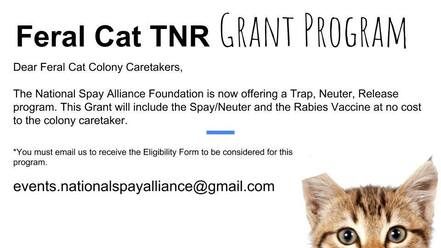Newsletters |
 If you live in Northwest Georgia chances are you have seen cats "free roaming" either around your house or around shopping centers. These cats are commonly fed and watered by someone in the community. What is the difference between feral, stray or pet cats? Well they are all members of the same species; they are all domestic cats. But stray cats and feral cats are also different from each other in a very important way—in their relationship to and interactions with people. Pet and stray cats are socialized to people. Feral cats are not socialized to people. While they are socialized to their colony members and bonded to each other, they do not have that same relationship with people. Because they display unsociable traits, they deter possible owners and are unadoptable if taken to a shelter. Kittens of community cats can be adopted into homes if they are socialized at an early age. Community cats are un-owned cats that live outdoors in the community. They may be feral or friendly, may have been born into the wild, or may be lost or abandoned pets. Community cats live and thrive in urban and rural settings. They choose their residence in locations where there is shelter and a food source. Many community cats are just as healthy as those that are kept as pets. These cats often have an equally low rate of disease and have life spans that are comparable to those kept as pets. Our staff commonly speaks to clients who do not mind feeding these cats, but do not want them breeding and having more kittens. Trap-Neuter-Return is the humane and effective approach for reducing the number of stray and feral cats. Removing these cats from the community doesn't eliminate the nuisances they create and actually encourages cat populations to steadily grow. When you return cats that have been sterilized, they continue to use resources but are unable to reproduce, decreasing the free-roaming cat population over time. Sterilization also reduces problematic behaviors like fighting and spraying. The cat's physical health improves and they are rabies vaccinated. Once the population stabilizes and there are no new kittens born, the numbers in time will actually begin to decrease. In 2017 NSAF became a Target Zero fellow. This program states: A required area of focus to reach a 90+% shelter save rate is to reduce the number of cats entering the shelter. In most communities, at least half of the shelter intake is made up of cats and, on average, less than 30% leave alive, while most community cats are typically euthanized. We are committed to stopping the euthanasia of healthy cats. This year 2019 NSAF has begun a TNR program in Whitfield County. Through two grants (Community Foundation, GA Dept. Of Agriculture) and donations from our clients and supporters we have begun the process of identifying organizations who have colonies that need sterilization. We have approved our first recipient: Dalton State College. (Please read the article attached). We are excited to begin and sustain this live saving program in Whitfield County. The program is as follows: Feral Grant TNR Program. This program will help feral cat colony caretakers. The grant will include the Spay/Neuter at no cost to the caretaker, and the Rabies vaccinations. All additional fees are covered under this grant as well. Please send a introduction email to: events.nationalspayallianc[email protected] We will send you a TNR Grant Form for you to complete (just some basic questions). If you meet our requirements we will give you a call, and finally after that, we will be meeting on site to survey the colony. We are proud to be able to offer such a live saving program. You can help by donating to us. You can help the community cats by having them spayed/neutered. Please feel free to reach out to us with questions or comments.
0 Comments
Your comment will be posted after it is approved.
Leave a Reply. |
|||||||

 RSS Feed
RSS Feed
